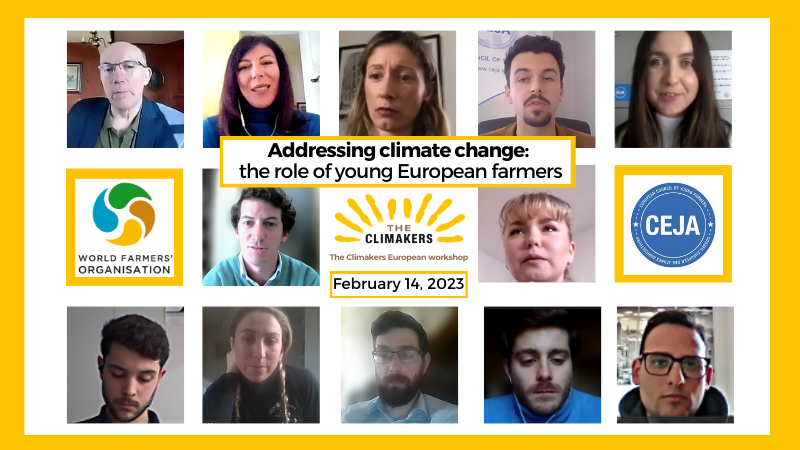On February 14, the Climakers community from Europe convened digitally for a regional workshop focused on the role of young European farmers in addressing climate change issues.
Jointly organised by the World Farmers Organisation (WFO) and the European Council of Young Farmers (CEJA), the workshop reported on the results of The Climakers initiative so far, highlighted the climate adaptation and mitigation strategies of young farmers in Europe, and set the tone for a youth-driven agenda in global agriculture.
Moderated by Sébastien Pérel, policy officer at CEJA, the event gathered the members of CEJA and the regional constituencies of the WFO for an open discussion on the critical topics of the farmer-driven climate change agenda: sustainable livestock, carbon farming and the ongoing crisis and fertilizing challenges.
The WFO President Arnold Puech d’Alissac officially opened the meeting by highlighting that “farmers are the most exposed to the changing climate; still, over centuries, they have learned how to adapt to climate change and mitigate its effects at the farm level. During the Climakers Initiative experience, we have witnessed farmers’ importance in this process, proving they are a vital part of the solution once more.”
He continued by underlying young farmers’ crucial role in ensuring food systems’ sustainability: “young farmers are the present and future of agriculture. They must be supported and empowered to engage in agriculture, recognize it as a profitable (and, therefore, sustainable) profession, and see themselves as entrepreneurs.”
Consequently, it is vital to hear from them and engage them in policy decision-making on agriculture and related topics, including climate change.
Following Mr Arnold Puech d’Alissac, Diana Lenzi, President of CEJA, added that “farmers are both at the centre of the climate change challenge and at the same time the most vulnerable to its effects. We don’t only want possible solutions; we want solutions that work”.
She then renewed her appreciations on the Climakers initiative and emphasized the concrete actions young farmers in Europe are already bringing on their farms and at the international debates arenas.
The workshop went deeper with a video from Miguel A. Lizarazo, senior research associate of the Climate Action lever at Alliance of Bioversity International and CIAT and CGIAR, presenting The Climakers Guidelines for Policy Makers. This practical toolkit aims to offer national Governments solutions to support the implementation of the Paris Agreement at the national level based on farmers’ needs, expectations and best practices already implemented by producers, identified and gathered by The Climakers Initiative.
These guidelines explore three interrelated principles and outline some critical areas to help inform the national and global decision-making process to address climate change in agriculture.
Then it was time for the Stories from the Field, starting with Thomas Duffy, a young dairy producer from Ireland that presented to the audience possible green solutions for the livestock sector, followed by Elisabeth Hiden, a young women farmer from Sweden that brought into the discussion her family’s experience on forestry and net sequestration.
Right after, we moved to Poland with Hanna Jaroslawska and to Spain with Felipe Cortines to find out how they are hard-working to keep Climate Action alive and kicking while addressing the current crisis and fertilizer shortages.
The debate was very active thanks to the online audience’s engagement, which kept asking questions to the panellists and bringing experiences, ideas, needs, constraints and various points of view.
To close the debates and summarise all these inputs, Marion Picot, Secretary General of CEJA started by saying that “what I really keep from this morning are those stories from the field, because it reflects first and foremost the fact that if you give some time to farmers to explain what they’re doing, there’s always a lot of generosity in doing so.”
She also emphasised the importance of promoting “a youth-driven farming agenda to reach our collective climate objectives!”.
Then she closed by wishing that this last climate workshop will be the starting point of something more significant for the future.
Following this wish, Ms Luisa Volpe, Advocacy, Policy and Partnerships Practice leader at WFO, reiterated that the next step is “thinking of something bigger and stronger, starting from today”.
Ms Volpe also took the occasion to put light on all the activities the WFO is promoting for young farmers, starting from the WFO Gymnasium third edition and the new huge project of building a “youth branch”.
The WFO Gymnasium’s third edition and the new huge project of building a “youth branch” of the WFO, called WFO Young, aim to strengthen the voice and advocacy power of the next generation of farmer leaders.
“My invitation to you is to think of future steps that we can do together to expand the program beyond The Climakers initiative and continue on the path we have built together,” she closed.


